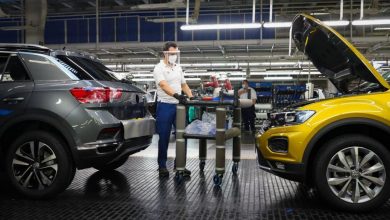As the novel coronavirus continues to spread across the world, automakers are taking extreme measures in the form of plant closures to halt the spread of COVID-19, the disease the coronavirus causes. The situation remains fluid as more European companies suspend work and US automakers extend shutdown periods.
Here are all the automakers and companies that have elected to halt production in the US and Europe so far. Information on Detroit’s Big Three begins our coverage, followed by all other shutdowns organized by the date automakers announced them.
Ford
Ford shut down all European and North American production on March 19 to help combat the spread of COVID-19. While Ford intended to reopen facilities and restart production on March 30, the company on March 31 delayed that goal indefinitely. However, it plans to start ventilator production at one of its US facilities on April 20. Production of Ford vehicles and engines across the pond is expected to resume on May 4 at the soonest.
General Motors
GM joined Ford on March 18 in announcing a total suspension of all North American production starting March 19. The automaker said it would pull its facilities offline in a “cadence” and each plant would receive specific instructions. GM hasn’t made any announcements regarding when its plants will resume normal production, but it is building ventilators and masks at two US GM facilities. The automaker made the decision to build personal protective equipment on its own before the Trump administration forced it to do so by invoking the Defense Production Act.
Fiat Chrysler Automobiles
FCA joined Ford and GM on March 18 in announcing it would suspend all North American operations to help stop the spread of COVID-19. While GM and Ford haven’t established new dates to restart production, FCA told Roadshow on April 7 it now plans to bring workers back on May 4. An FCA spokesperson originally told Roadshow the automaker’s Italian plants could open on April 14, but as of April 15, the company said it will continue to follow guidelines from the Italian government. The country will remain in a lockdown state until May 3, which leaves a production start at least a few weeks away. The automaker will evaluate other European plants in the coming weeks.
Kia
Kia on March 24 said it would suspend production at its manufacturing plant in Georgia starting March 30. The shutdown will last two weeks, and includes a previously planned suspension to retool for new vehicles. The automaker originally planned to restart production on April 13, but the new target date is April 27.
Mazda
The Japanese automaker said on March 24 it will halt production at its Japanese plants for 13 days. When they come back online, the company said it will only run daytime shifts through April 30. Mazda’s sole plant in Mexico shut down for 10 days starting March 24, and its plant in Thailand suspended operations for 10 days.
Aston Martin
The British luxury carmaker said on March 24 it would suspend all production starting the same day. The company plans to reopen its plants across the UK on April 20.
Volvo
The Swedish luxury carmaker made its production suspension official on March 20 and said its European plant would close until April 5. After the date came and went, Volvo told Roadshow it now targets April 20 to reopen its European factories. In the US, its plant went idle starting March 26 with plans to restart operations on April 14. Volvo has since nixed the target and hopes to restart work at its US plant on May 4. Volvo also reported a bit of hope from China, though. All four of its Chinese plants are up and running again and Volvo noted showroom traffic has returned to normal.
Rivian
The startup electric carmaker said on March 20 it would suspend all operations at Rivian facilities. The automaker had not started production of its first vehicle, the R1T electric pickup, but preproduction was underway. All workers are supposed to receive their full pay, but the company didn’t say when it expects to come back online. In April, the company confirmed the work stoppage will delay the R1T and R1S electric vehicles until next year.
Tesla
After a lot of back and forth, Tesla said on March 20 it would close its signature plant in Fremont, California, starting March 23. The news followed confusion as the automaker appeared to ignore a shelter-in-place order for the county, but then cited unclear guidance from the government. CEO Elon Musk has said ventilator production could start in the weeks to come.
Bugatti
France’s supercar maker, Bugatti, said on March 20 it has closed its production plant in Molsheim to help stop the spread of COVID-19. The firm threw its full support behind French regulations and said keeping its workers healthy is a top priority.
Bentley
The British luxury brand said on March 20 it would suspend production starting the same day in the UK. The factory shutdown will last four weeks, according to the company. Like so many other automakers, the company said it wants to protect its workers, but also acknowledged a slowdown in demand in markets around the world and supply chain interruptions.
Jaguar-Land Rover
On March 20, Jaguar-Land Rover confirmed it would temporarily shut down production at its UK facilities. Plants in Brazil and India will continue humming along for now, and the automaker said it hopes to restart production in the UK on April 20.
Volkswagen
Starting March 21, Volkswagen temporarily suspended production at its manufacturing plant in Chattanooga, Tennessee. The automaker made the announcement on March 19 and said all workers will receive their full pay during this time. Like numerous other facilities, VW said it would use the week to conduct a deep clean of the facility and sanitize the entire factory. As of April 9, the automaker said it’s not clear when it will be able to resume operations normally and furloughed the entire production and maintenance workforce. The furloughs will last no longer than four weeks, and while workers will lose their pay, VW will still pay health care benefits and bonuses.
On March 17, Volkswagen Group announced it would suspend production at numerous production sites across Europe, including Slovakia, Portugal and Spain. At the time, the automaker said it expected the suspensions to last two weeks. The shutdowns also affect VW Group components plants. It’s not clear when the plants will come back online.
Toyota
On March 18, Toyota joined a growing list of automakers suspending all North American production operations, saying every plant in the US, Canada and Mexico would shut down starting March 23. On March 26, Toyota reassessed the situation and said the production suspension will now last until April 20. On April 8, the target date moved to May 1.
Toyota said every facility will undergo a thorough cleaning process and teams will sanitize the entire facility. Toyota asked workers to take the time to also help adjust to life at home as more regions close schools, leaving children at home.
Subaru
The Japanese automaker announced March 19 that its sole US production plant would suspend production temporarily starting March 23. The company planned to restart operations on March 29, but now, the target date is May 8. The company said the move will help Subaru adjust to market demand and protect the health of workers at the plant and that workers will receive their full wages during the shutdown.
Honda
The Japanese automaker became the first company operating in the US to announce a major production stoppage on March 18. The production suspension, which also applies to transmission and engine plants, was set to end after a week, but now, Honda currently expects to resume production on May 4.
Hyundai
The South Korean automaker said on March 18 that it temporarily shut down its plant in Alabama after a worker tested positive for COVID-19. The company said the worker had not been on the job recently and all team members were made aware of the situation.
Hyundai expects its Alabama plant to reopen on May 4, the company said on April 14. The plant will undergo additional sanitation measures during the suspension.
Nissan
The Japanese automaker announced on March 18 it would suspend all production in the US starting March 20. Operations in Mexico and Canada are not affected at this time. The plant shutdowns were supposed to run until April 6, but on April 1 Nissan announced plants would remain shut down through the end of the month. The automaker announced that an employee working at the company headquarters tested positive for COVID-19 on April 4.
Porsche
The automaker said on March 18 it would stop production at its German plants to keep its workforce safe and healthy. The work stoppage was to last at least two weeks, but on April 6, the company decided to officially postpone production until April 14. With the shutdown extended yet again as of April 14, it’s not clear when the company will restart production.
Like Daimler, Porsche said the global supply chain makes it impossible to continue output as normal. The company said it’s also prepared for a decline in demand and will work to secure its finances.
Rolls-Royce
The British luxury marque said on March 18 it would suspend production at its UK facility for two weeks starting March 23. The shutdown was to extend into a preplanned two-week shutdown for the Easter holiday as an effort to keep workers healthy and follow new guidelines put in place by the federal government.
Daimler
Daimler shut down production at its Mercedes-Benz plant in Alabama on March 23 and expects production to restart on April 20, a spokesperson tells Roadshow.
On March 17 it would stop all production in Europe for at least two weeks. The automaker cited global supply chains that can’t operate at their full capacity and said the precaution is also meant to protect its workforce from the virus’ spread. On April 8, the company extended the production shutdown until April 30.
PSA Group
The automaker that oversees the Peugeot, Citroen, DS, Opel and Vauxhall brands announced on March 16 all of its plants across Europe would shut down on a tiered schedule. As of March 16, two plants shut down, one in France and one in Spain. On March 17, eight additional plants went offline; three other plants halted production on March 18 and two more on March 19. The plants are spread across France, Spain, the UK, Poland, Germany and other locations. The plants were to reopen on March 27, but PSA Group announced that day that it would establish a new timeline for resumption.
Renault
France’s Renault said it would suspend production until further notice at 12 of its sites across the country on March 16.
Ferrari
The Italian supercar maker announced on March 16 that both of its plants in Maranello and Modena, Italy, would shut down until March 27. On April 14, Ferrari postponed its production resumption until May 3.
Lamborghini
The automaker said on March 13 it would halt operations at its plant in Sant’Agata Bolognese. It’s unclear when production will restart.
Ducati
The motorcycle maker first announced it would stop production at its plant in Italy on March 13. The plant was supposed to reopen March 18, but postponed to March 25. Ducati did not respond to a request for comment on when its operations will resume.















Be respectful, keep it civil and stay on topic. We delete comments that violate our policy, which we encourage you to read. Discussion threads can be closed at any time at our discretion.